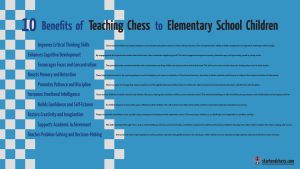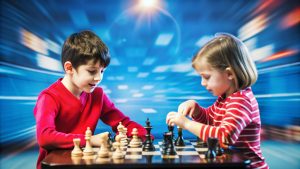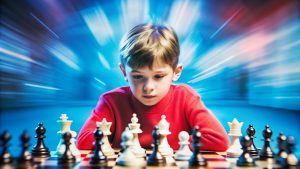10 Benefits of Teaching Chess to Elementary School Children
Teaching chess to elementary school children offers more than just an engaging pastime; it provides a wealth of cognitive, emotional, and academic advantages. As a game rooted in strategy and forward-thinking, chess challenges young minds to develop critical thinking, improve problem-solving skills, and enhance memory retention. These essential skills are not only crucial in the classroom but also in real-life scenarios, where the ability to think ahead and make informed decisions plays a pivotal role in a child’s overall success.
Beyond cognitive growth, the benefits of teaching chess extend to fostering emotional resilience, patience, and discipline. Chess encourages students to handle setbacks gracefully and to think strategically before making decisions, teaching them valuable lessons in patience and perseverance. With these far-reaching benefits, integrating chess into elementary education can have a profound and lasting impact on children’s development, setting them up for academic success and personal growth.

-
Improves Critical Thinking Skills
Chess sharpens critical thinking in children because it forces them to choose the best out of many possibilities. They should be taught to think several moves ahead, not only analyzing their moves but also what their opponents are likely to do. This is a very important skill in problem-solving, either in school or in real life, because it enables the brain to assess a situation very well before making decisions.
Chess, when developed in children, helps them meet academic expectations with confidence. It teaches them to break down problems into smaller pieces, think about alternatives, and approach tasks with a strategy for solving them-a sure means of establishing the best foundation in such relevant areas as math, reading, and science.
-
Enhances Cognitive Development
Chess provokes cognitive development by successfully turning on both the left-logical and right-creative sides of the brain. This initiates high-order thinking, enhancing memory, attention span, and speedy processing of information. While children exercise these cognitive skills, they are developing their brains’ capacity for learning and hence become more proficient in understanding new concepts in various subjects.
Entwined with this goes academic performance itself: in developing brains, children playing chess turn into more adaptive learners to input the information they’re given and retain it much more successfully. As a result, their school performance increases a lot.
-
Teaches Problem-Solving and Decision-Making
Problem-solving on the board lies right at the core of playing chess. Every move involves defeating a certain problem and finding the most appropriate decision in that particular situation, thus compelling one to think critically. In this case, it would be beneficial for children because it would help them develop good problem-solving skills; they would learn how to look at situations, consider various options, and then make proper decisions based on the facts available.
These decision-making skills will carry over into life, as children approach problems with a great deal of confidence and patience. Acquiring methods for working out complex challenges in chess gives way to a deeper understanding of how to deal with real-life situations through logic and clarity.
-
Boosts Memory and Retention
This implies that it requires players to remember prior moves, strategies, and patterns, thereby boosting memory retention. By indulging in the game regularly, the orientation of the brain is in such a way that there is quick and efficient recall of information. This improved memory will help children not only in chess but also in academics, especially when it comes to subjects requiring them to memorize stuff, like mathematics, history, or science.
This, in turn, enhances a child’s ability to remember information learned in the classroom: everything from historical dates to mathematical equations will be better retained with the improved memory accrued through chess, contributing to a more successful academic experience.
-
Encourages Focus and Concentration
Chess is a game that requires one’s attention and full concentration. Players need to stay aware of the next moves that they will make and also be aware of what the opponent is playing, while maintaining mental discipline throughout the game. This maintained concentration can help children learn how to focus on working in an environment that has quite a number of distractions, which is a social asset in schools.
The long periods of concentration that chess provides have direct parallels in classroom learning. Chess often helps children develop an ability to focus more clearly in the classroom and enables them to complete assignments more effectively with minor distractions.

-
Promotes Patience and Discipline
Chess is a game of patience and strategy; every fairly careless decision leads to a mistake. Chess teaches the child patience by teaching him to wait, analyze the situation properly, and plan his next move accordingly. Chess teaches discipline because after losing, success would come from thoughtfulness, which means self-discipline and patience in every activity.
These qualities are indispensable at school and in later life. Patience and discipline allow children to look at challenges with a clear mind and, therefore, make better decisions that ensure their success at school and beyond.
-
Increases Emotional Intelligence
Chess could serve as an effective vehicle in building emotional intelligence. It teaches a child how to handle and manage one’s emotions, handle frustration patiently, and deal with losses poetically and equanimously. Learning to reflect upon mistakes and make better strategies helps develop resilience and the ability to regulate their emotions, which is of great significance for competent handling of social situations and personal crises.
Chess has helped them build better relations and interact more effectively with others because of the emotional intelligence developed. They understand others, try to put themselves into other people’s shoes, manage conflicts better, and still keep smiling when life gets tough.
-
Fosters Creativity and Imagination
While chess is a very strategic game, it is also extremely creative, requiring lots of imagination. Children have to think out of the box to bring on new moves and to see what their opponent’s strategies might be. This balance of reason and creativity helps train a child’s mind to think in new and original ways; it can also increase their problem-solving capabilities in all aspects of life.
The creativity developed through chess is not limited to the realms of academic art and writing but will be an imperative tool for innovative solutions in the fields of science, technology, engineering, and mathematics. Chess evokes in children the capability of marrying logical thinking with imagination, hence turning out to be all-rounded, creative thinkers.
-
Builds Confidence and Self-Esteem
In such a way, while learning to play and being a good chess player, kids create some sort of confidence in their intellectual abilities. Every new victory confirms their belief in strength, and each loss is a new experience and an opportunity to learn and grow. This eventually gains self-esteem whereby a child realizes his or her full ability for improvement and success.
This boost in confidence will spill over into other aspects of their lives, as many children who feel competent in chess often will take on academic obstacles and even social situations with a bit more self-assurance. Confidence earned from chess helps them to tackle challenges for which they usually never would have risked failure.
-
Supports Academic Achievement
These benefits of teaching chess-enhanced critical thinking, memory, focus, creativity, and emotional intelligence-accrue into better academic performance. The improved critical thinking, memory, focus, creativity, and emotional intelligence that accrue from teaching chess contribute directly to better academic achievement. The available research indicates that students who play chess on a regular basis outperform their peers in math, reading, and other subjects. Chess provides an increased understanding of logic and reasoning, which enables students to perform exceptionally well in subjects that necessitate analytical thinking.
Chess builds a strong base for academic achievements through the development of intellectual and emotional potential. Children taking part in chess are often better prepared for standardized tests, classroom discussions, and problem activities that will help them achieve their goal of long-term academic success.

Conclusion
The benefits of teaching chess to elementary school children go far beyond learning a game. Chess fosters cognitive development, sharpens critical thinking, and enhances problem-solving skills, all of which translate to improved academic performance. By engaging both sides of the brain, chess promotes creativity while strengthening memory and focus. These intellectual skills lay the groundwork for a more confident, capable student who is better equipped to tackle challenges both inside and outside the classroom.
Beyond academics, the benefits of teaching chess extend to emotional growth, building resilience, patience, and self-discipline. Children learn to manage frustration, handle defeat with grace, and approach problems calmly. This holistic development creates well-rounded individuals who are not only smarter but also more emotionally intelligent. Incorporating chess into the curriculum offers an exciting opportunity to nurture both the minds and hearts of young learners, preparing them for success in life.
We’ve prepared a podcast to accompany this article, offering the same insights in an audio format. If you enjoy listening, give it a play!
References:
- Campitelli, G., & Gobet, F. (2004). “The relation between chess skill and cognitive abilities: A meta-analysis.” Intelligence, 32(3), 333-350.
- Zarghami, M., & Ghadiri, F. (2016). “The Effect of Chess on Students’ Academic Achievement.” International Journal of Educational Research, 5(1), 25-30.
- Hoffmann, R. (2004). “Chess as a tool for improving students’ concentration.” Educational Studies in Mathematics, 55(3), 253-265.
- Rosen, Y. (2009). “Teaching chess to children: The impact of chess on emotional and social skills.” International Journal of Social Science Studies, 7(2), 89-102.
- Fridman, A. & Gavrilova, T. (2015). “Chess in Education: Evidence from the Field.” Journal of Educational Psychology, 107(4), 1047-1057.



0 Comments